Posts Tagged ‘Leadership’
181 How To Build Legendary Software | Tim Tully CTO of Splunk
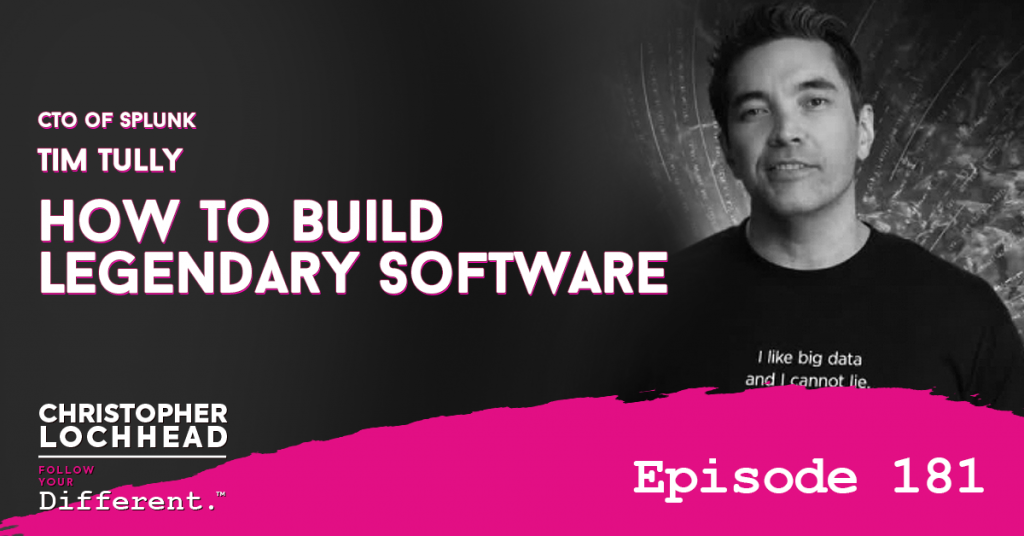
Podcast: Play in new window | Download (Duration: 57:45 — 39.7MB) | Embed
Subscribe: Apple Podcasts | Spotify | Pandora | RSS | More
Tim Tully is one of the most legendary technologies and product leaders of this generation. He is the Chief Technology Officer of $35 billion market cap company Splunk. He also runs the engineering, product, and tech operations.
In this episode, we get into all of it, how to execute a big, bold product vision, what it takes to run a major technology organization in the era of COVID. Find out why Tim thinks that software needs to be indulgent in the way that it delivers an experience and much more.
Born To Code
Tim was at Yahoo for years. He did a ton for Yahoo’s modern business. Most notably, Tim was on the team that helped to create the open-source database Hadoop. If you’re in the tech world, you know how big a deal that is. If you’re not, well Google it and you’ll see but Hadoop is a major contribution to the data world.
He shares in this episode how he grew up from a “tech household,” as both his parents were programmers from Silicon Valley in the 70s.
“Obviously coding is one way that I can do a lot of things in a very flexible way and have a lot of control over a system.” – Tim Tully
Inside Tim’s Mind
Tim shares that his thoughts are classified into two things: what he wants to try to do next or what am he wants to try to improve. He is in constant search of how to improve things and how to solve a problem in front of him. He shares that although its innate in him to solve problems on his own, the real challenge of leading a team is how to help your team solve the problems with you.
“If you’re like a true engineer, it’s really hard to let go of just solving every problem yourself. You have to very quickly learn that there’s a team that needs to get the job done. You’re not helping the team by solving the problem for them. What your job is to remove roadblocks and help them solve the problem and bring them along.” – Tim Tully
Leading The Team
Tim also shares how he as Splunk’s CTO is responsible not only for vision but also for delivering products since he is also the head of engineering. He gave a great insight into how his team works and ultimately, how he leads his team of champions.
“I learned over time is the very best architects that you can have in a company, I think we have that here at Splunk. You know, they obviously have high IQ, but they have to have high EQ because the problem is they have to be able to influence and persuade large swaths of people without directly managing them.” – Tim Tully
To know more about Tim Tully and how to build a legendary software, download and listen to this episode.
Bio:
Tim has served as Splunk’s Chief Technology Officer since 2017.
Prior to joining Splunk, he spent 14 years at Yahoo in various roles, including leading engineering for the Media Organization, where his teams developed leading brands such as Yahoo.com, Yahoo Finance, Yahoo Sports, Yahoo Fantasy, Tumblr, Huffington Post, and Flurry.
He previously served as Yahoo’s Chief Data Architect, where he led architecture across all data teams and developed much of that stack as well.
Before that, Tim served as a Member of Technical Staff at Sun Microsystems in the JavaSoft team.
Tim holds an M.S. from Carnegie Mellon University and a B.S. from the University of California, Davis.
Links:
Linkedin: Timothy Tully
Splunk CEO Doug Merritt on Episode 166
We hope you enjoyed this episode of Follow Your Different™! Christopher loves hearing from his listeners. Feel free to email him, connect on Facebook, Twitter, Instagram, and subscribe on iTunes! Get amazing, different stories on business, marketing, and life. Subscribe to our newsletter The Difference.
173 A Unique American Perspective w/ MK Palmore, Marine, FBI Exec & Cybersecurity Advisor
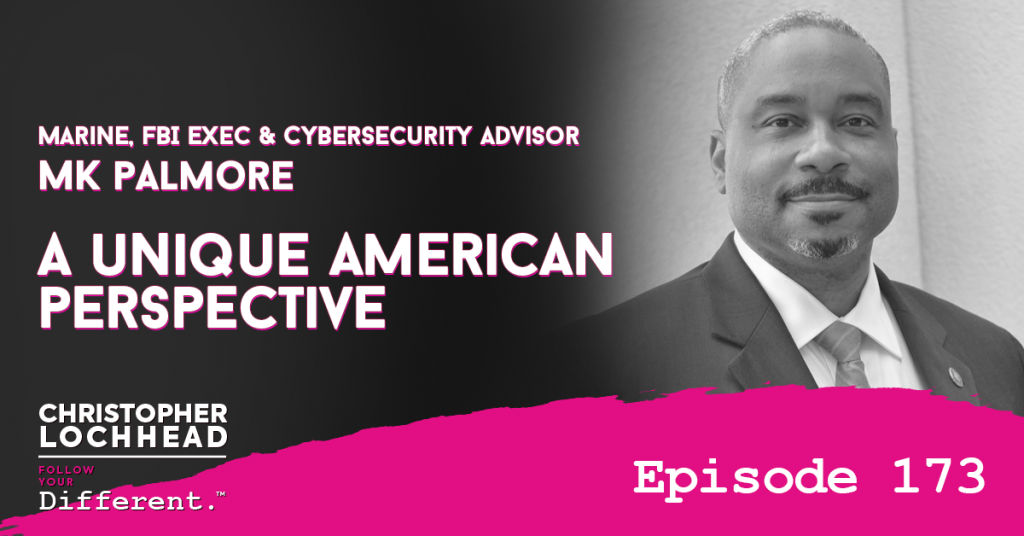
Podcast: Play in new window | Download (Duration: 1:19:10 — 54.4MB) | Embed
Subscribe: Apple Podcasts | Spotify | Pandora | RSS | More
We listen today to an extraordinary and unique perspective on what is happening in the United States right now. Our guest, the legendary MK Palmore, whose entire background positions him to be a leader of this moment that we all find ourselves in.
Not only does MK have this incredible career as a Marine, as an FBI agent, now, but he’s also a Silicon Valley-based executive at a major tech company. He is African American and his perspective on our world right now is like none other I have seen or heard, and we go deep on all of it. This is a very powerful conversation we hope gets heard by many.
To Serve and To Protect
Coming from a solid law enforcement background, MK shares the conversations that he is having with his former colleagues. He mentions that there should be an understanding about the basic concept of “being called to serve and protect” among law enforcers. Unfortunately, a number of law enforcers have a different agenda other than this core mission.
“It requires, again, an understanding that, ‘hey, a potential problem exists.’ This is from law enforcement to the other side [minorities]. We need to be willing to listen so that we can make adjustments to how it is that we go about policing, which I think will be a huge challenge.” – MK Palmore
Police-ing Is Extremely Hard Work
MK describes the demands of police work. There are certain challenges involved in that profession that don’t lend themselves to flow judgments. As these recent situations arise, he believes that there should probably be some training changes that need to happen on the law enforcement side.
“Law enforcement officers are trained in a particular way so that they can make quick judgments or assessment of situations so that they can mitigate and bring down a situation as quickly as possible, to de-escalate a situation quickly as possible.” – MK Palmore
Comprise To Let Healing Begin
MK shares how strong leadership is needed to talk about issues and to compromise. This is the only route where healing can begin. He shares his experiences as an African American former FBI agent and now a Tech professional and how he contributes to the current issues.
“While I do not believe that there is an explicit racism present in law enforcement, I do believe that there is implicit racism in our society. To believe that law enforcement is somehow immune to this, I think, is misplaced.” – MK Palmore
To know more about MK Palmore, a Marine, FBI Exec & Cybersecurity Advisor and his unique American perspective, download and listen to this episode.
Bio:
MK was born and raised in Washington, D.C. It’s no surprise he was influenced daily and at an early age by the formative sights and sounds of our government at work.
As a youth, he had already decided to embark on a career of service. This led him to the shores of Annapolis, where he was a midshipman at the United States Naval Academy, and afterward as a commissioned officer in the United States Marine Corps.
Following his military service, MK began a 22-year journey as a Special Agent of the Federal Bureau of Investigation (FBI), a key player behind numerous high-level investigations and an early combatant in the fight against cybercrime.
During this impressive career of public service, MK honed his leadership skills, rounding out his tenure in an executive position leading the cybersecurity investigative teams of FBI San Francisco.
Links:
We hope you enjoyed this episode of Follow Your Different™! Christopher loves hearing from his listeners. Feel free to email him, connect on Facebook, Twitter, Instagram, and subscribe on iTunes!
071 We Reserve The Right To Refuse Service
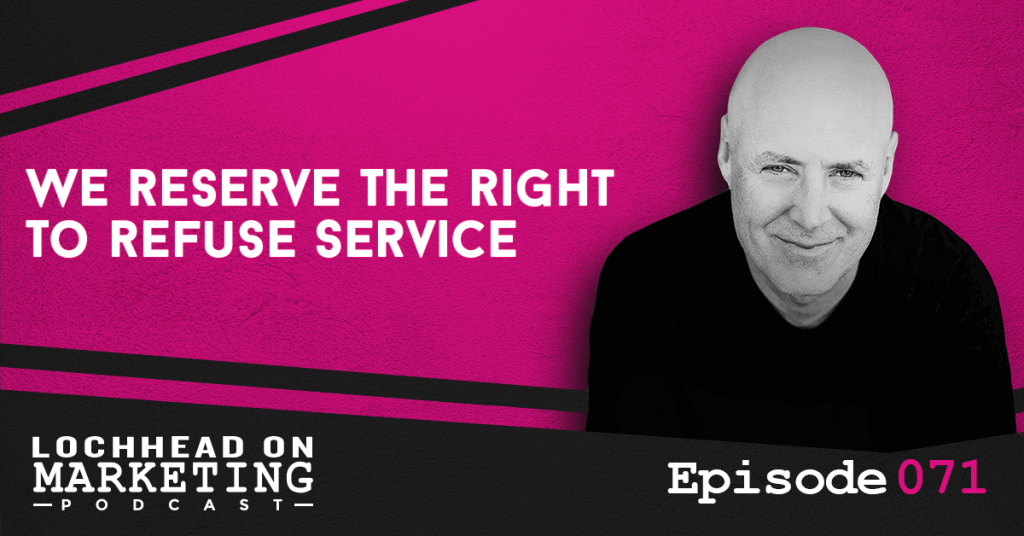
Podcast (lochheadonmarketing): Play in new window | Download (Duration: 18:33 — 12.7MB) | Embed
Subscribe: Apple Podcasts | Spotify | RSS | More
One listener writes: “This is such a confusing time and people are on edge. There’s a lot of arguing and mistrust in the US. It seems like we see more people acting out. In our case, we’ve had some customers behave really badly. When is it okay to turn a customer away?”
In this episode, Christopher shares his views on this matter about your right, as a business, to refuse service to customers.
What The Law Says
The law states that you are allowed to refuse anybody’s service, but you can’t do it on the basis of color, race, gender, sexual orientation, and other subjects along those lines. What Christopher advises is to seek legal advice and make sure to have consistent guidelines to enforce on your business, so your employees are well-guided.
“I think it’s okay to refuse service to Anybody who’s being a shithead and we had a situation happen here in the Santa Cruz Monterey Bay Area.” – Christopher Lochhead
Kicked Out Due To Bad Behavior
Christopher shares an incident that happened recently in a restaurant in Santa Cruz Monterey Bay Area called Bernardus Lodge where an Asian-American was spending their Fourth of July holiday. A Tech CEO, named Michael Lofthouse, who was also dining in, gave out racial slurs to the family.
The restaurant attendant, Gennica Cochran, immediately asked Michael to leave the premises to protect their customers.
“Number one, the folks at the who run the Bernardus Lodge have some core values and that in one way or another, whether it was formal or informal, they had communicated to their team, including, of course, Gennica Cochran and that there were certain behaviors they would tolerate. Racism, acting out and being an asshole clearly was something they were not going to allow. Gennica felt empowered to do that. I don’t know if she asked for permission. I don’t know what she did. But she took action.” – Christopher Lochhead
Please Wear A Mask
Christopher also shares some of his personal experience with enforcing wearing a mask. He is a strong supporter of this and he has received some backlash because of being vocal about it
“If you don’t like me, or you don’t want to listen to my podcast, because I’m trying to promote wearing masks in the United States, that’s okay. I think whatever the issue is, there comes a time in our lives as people and as business leaders, where we have to be clear about our core values and stand up for them.” – Christopher Lochhead
To hear more about having the right to refuse customers, download and listen to this episode.
Bio:
Christopher Lochhead is a #1 Apple podcaster and #1 Amazon bestselling co-author of books: Niche Down and Play Bigger.
He has been an advisor to over 50 venture-backed startups; a former three-time Silicon Valley public company CMO and an entrepreneur.
Furthermore, he has been called “one of the best minds in marketing” by The Marketing Journal, a “Human Exclamation Point” by Fast Company, a “quasar” by NBA legend Bill Walton and “off-putting to some” by The Economist.
In addition, he served as a chief marketing officer of software juggernaut Mercury Interactive. Hewlett-Packard acquired the company in 2006, for $4.5 billion.
He also co-founded the marketing consulting firm LOCHHEAD; was the founding CMO of Internet consulting firm Scient, and served as head of marketing at the CRM software firm Vantive.
Links:
The Right to Refuse Service: Can a Business Refuse Service to Someone?
San Francisco tech CEO kicked out of Carmel Valley restaurant following racist rant caught on camera
Ford CEO defends law enforcement use of Police Interceptor vehicle
We hope you enjoyed this episode of Lochhead on Marketing™! Christopher loves hearing from his listeners. Feel free to email him, connect on Facebook, Twitter, Instagram, and subscribe on iTunes! You may also subscribe to his newsletter, The Difference, for some amazing content.
169 A Republic, If You Can Keep It | David Crane of Govern For California
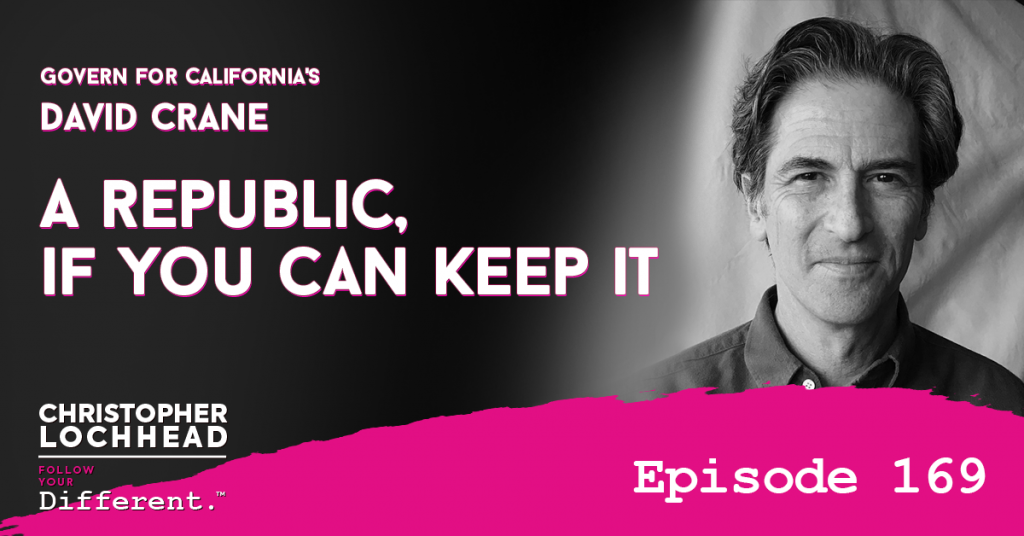
Podcast: Play in new window | Download (Duration: 1:35:29 — 65.6MB) | Embed
Subscribe: Apple Podcasts | Spotify | Pandora | RSS | More
Today, we have a very big conversation about how to drive real social and political change with a guy who’s a Stanford lecturer, who is a former adviser to Governor of California, Arnold Schwarzenegger, and today is the founder of Govern for California. His name is David Crane.
We go deep on why state and local governments matter so much and matter in ways that the federal government doesn’t, as it relates to yours and my day to day life. What really drives politicians, how the call we are having right now, for social and racial change in the US could actually lead to not much change at all, and what needs to happen in order to make real change occur.
Figuring Out Politics
David spent 25 years in business until he was 50 and ready to retire. Fate must have brought David to politics because his long time friend Arnold Schwarzenegger decided to run for office and asked for his help. He was a bit shocked when he first stepped into the ring as he didn’t realize how to play the game of politics.
“I thought I knew everything about politics and policy, that was my principal interest in life. I got up to Sacramento and I learned I knew nothing. It just blew me away at the age of 50 to learn that the area that had been my avocation that I thought I really knew, I didn’t know. “ – David Crane
Politics is Business
New people who get elected into office do not know the way the game is played. It is a business and David placed it into perspective in this episode. He shared how the State operates for its customers, who are the citizens, specifically the students who take Kto12 Education, Medicaid beneficiaries and corporations and business entities.
“The State of California alone this year will spend $300 billion 100 billion alone on K through 12. Education, 100 billion dollars alone on Medicaid. For now, more than 13 million Californians one in three Californians is covered by Medicaid. Well, the principal recipients of that 200 billion are employees and corporations and their customers. The state of California will pay very serious attention all the time to what’s going on with that government. They’re in the state capitol every day and the legislators and the governor see them all the time.” – David Crane
The Role of The Federal Government
David also shares the structure of state government versus the federal government. The former has three to five times the number of employees since they are service-oriented to the people of the state than the latter. He also likened the federal government as an “insurance company with an army.”
“State local governments do everything else. Public education, public safety, public transportation, and that’s why there are four times as many employees in the state local government than there are in the federal government, even though the federal government spends much more money.” – David Crane
To hear more about David Crane and his thoughts on what drives politicians, and how the call we are having right now for social and racial change in the US will not have much effect, after all, download and listen to this episode.
Bio:
David Crane is a lecturer in Public Policy at Stanford University and president of Govern for California.
From 2004-2010 he served as a special adviser to Governor Arnold Schwarzenegger and from 1979-2003 he was a partner at Babcock & Brown, a financial services company.
Crane also serves on the board of the Goldman School of Public Policy at the University of California and formerly served on the University of California Board of Regents and as a director of the California State Teachers Retirement System, Environmental Defense Fund, and the Volcker-Ravitch Task Force on the State Budget Crisis.
Links:
Standford University, Public Policy: David Crane
TheHill.com: Coronavirus aid should go directly to the people
Medium.com: CA Passes A Disappointing Budget
They Count on You Not Knowing TEDx PaloAlto
We hope you enjoyed this episode of Follow Your Different™! Christopher loves hearing from his listeners. Feel free to email him, connect on Facebook, Twitter, Instagram, and subscribe on iTunes!
166 Radical Business Transformation | Doug Merritt CEO of Splunk
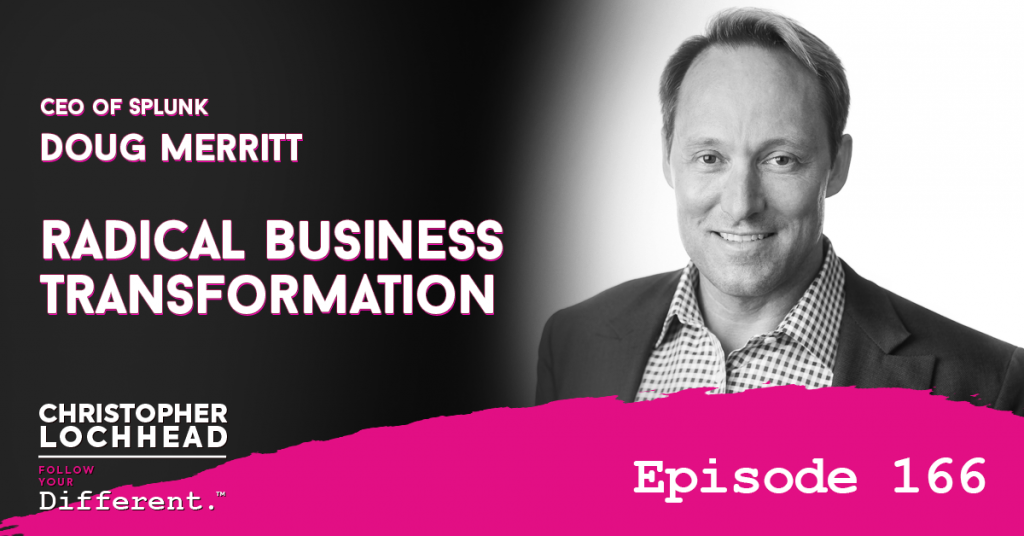
Podcast: Play in new window | Download (Duration: 36:28 — 25.0MB) | Embed
Subscribe: Apple Podcasts | Spotify | Pandora | RSS | More
Today, we speak with a very special guest about a critical topic: radical transformation. Doug Merritt of Splunk joins us for a conversation about Splunk’s journey, their radical technology, delivery model, and business model transformation.
Pay special attention to Doug’s depth and breadth of detail about their business, their technology modeling stack, business model, and their financial model. I think you’ll find it fascinating to hear what it really takes to be the CEO of a high-growth, high impact company.
Radical Transformation
Christopher shares that almost all aspects of the world are going through a transformation right now. Doug agrees about the uncertainties and changes in our environment. Likewise, he shares how Splunk has undergone and is continuing the process of radical transformation.
“We targeted over four years ago, four simultaneous transformations. First was shifting our business model. The second was completely rethinking and delivering a different product portfolio. The third was the market shift. Fourth, complete rethinking and reimplementation of our business processes and infrastructure technology. It’s been a lot of work. We’re not done. We’re not done yet, but we continue to make good progress.” – Doug Merritt
Risk and Reversibility
Doug shares an important point if you plan to have a radical transformation, that is to consider risks and reversibility. He relates sheltering in place or shifting to a work-from-home arrangement as a reversible decision. On the other hand, transforming the business model or pricing has an irreversible effect, or would entail a lot of work to reverse the risks.
“Jeff Bezos talks about it and I think it’s very catchy: is your change a one way door or a two way door? Obviously a one way door, you may get back in, but you have to get an axe and maybe a wrecking ball. It’s going to be a lot of pain and effort to get back in to a door like that. A revolving door in a hotel you go out, maybe you don’t like it, you can choose to go back in. It’s easier to reverse.” – Doug Merritt
Growing Splunk
Doug shares how fortunate the Splunk team is while undergoing a radical transformation. They initially have revenues and drastically improved it while transitioning, and while maintaining their public status. They also continue to acquire companies, such as their recent $1B SignalFx.
“To be able to take on that degree of change of disruption, of difficulty and somehow still over-deliver versus expectations, I think that we are in a category of one right now, but I’m hoping that there are more that come behind us.” – Doug Merritt
To hear more about Doug Merritt, CEO of Splunk and more about radical transformation, download and listen to this episode.
Bio:
Doug Merritt has served as our President and Chief Executive Officer and a member of our Board since 2015.
Previously, Merritt served as Senior Vice President of Field Operations at Splunk from 2014 to 2015.
Prior to joining Splunk, Merritt served as Senior Vice President of Products and Solutions Marketing at Cisco Systems, Inc., a networking company, from 2012 to 2014.
From 2011 to 2012, he served as Chief Executive Officer of Baynote, Inc., a behavioral personalization and marketing technology company.
Previously, Merritt served in a number of executive roles and as a member of the extended Executive Board at SAP A.G., from 2005 to 2011.
From 2001 to 2004, Merritt served as Group Vice President and General Manager of the Human Capital Management Product Division at PeopleSoft Inc. (acquired by Oracle Corporation). He also co-founded and served as Chief Executive Officer of Icarian, Inc. (since acquired by Workstream Corp.), a cloud-based company, from 1996 to 2001.
Merritt holds a B.S. from The University of the Pacific in Stockton, California.
Links:
We hope you enjoyed this episode of Follow Your Different™! Christopher loves hearing from his listeners. Feel free to email him, connect on Facebook, Twitter, Instagram and subscribe on iTunes!
060 10 Commitments Companies Must Make to Advance Racial Justice | Marketing PodStorm 22
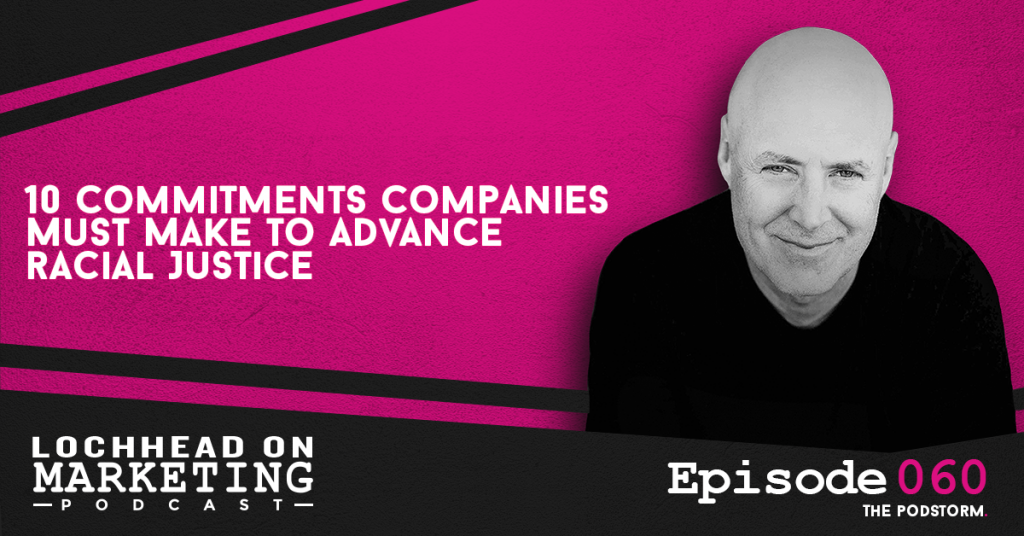
Podcast (lochheadonmarketing): Play in new window | Download (Duration: 14:59 — 10.3MB) | Embed
Subscribe: Apple Podcasts | Spotify | RSS | More
In this episode, let’s take a look at Mark R. Kramers’s article for Harvard Business Review article entitled The 10 commitments companies must make to advance racial justice. Mark is a senior lecturer at Harvard University.
Although Christopher does not agree with Mark’s article in its entirety, he believes these are very powerful ideas worth discussing and advancing inside our companies. Frankly, these commitments should be a must for all business people.
Racial Justice On a Marketing Podcast?
Mark’s list is fascinating and you might be asking why are we discussing this on Lochhead on Marketing. Aside from the fact that its a timely discussion, on a marketing perspective, Christopher believes marketing plays a huge part in creating a culture.
“It’s hard to succeed in the marketplace when you go to market a shitty product. it’s impossible to have legendary internal marketing and communications built on shitty products and policies. Additionally, we are living at a time of mass scrutiny, your category brand and therefore ultimately your revenue will suffer if you’re not viewed as being forward on your skis on topics of race, equality, diversity, and the fair treatment of your people.” – Christopher Lochhead
The 10 Commitments
Christopher discusses each of the commitments and cites Mark’s examples, occasionally adding his thoughts, inputs,and views on these matters.
1. Commit to anti-racism personnel policies and racial-equity training.
Adopt a no-tolerance-for-racism policy like Franklin Templeton’s, which led to its swift, recent termination of Amy Cooper following her altercation with Christian Cooper,
2. Commit to pay equity.
Studies that show closing the racial pay gap would increase U.S. GDP by 14%, or more than $2 trillion.
3. Commit to giving employees a voice.
Ensure representation of hourly employees, women, and people of color in all employment policy decisions. Consider employee representation on your board — it’s a legal requirement in Germany and is one reason why its economy recovered more strongly from the Great Recession than America
4. Commit to supporting full participation in democracy.
“Mark advocates making election day, a paid day off. He’s right. I’m generally no fan of more regulations for business but I’ll go a step further and say, States should mandate election day as a day off, with pay. if an employee wants to vote BEFORE election day, they should be given any day in November off to vote.” – Christopher Lochhead
5. Commit to lobbying for good.
“Mark says, commit at least 50% of your lobbying expenditures to support bills that improve conditions for communities of color I think this is a cool idea and I also think there are a lot of important causes.” – Christopher Lochhead
6. Commit to paying a living wage.
“The national minimum wage hasn’t been raised in a decade and has not nearly kept up with inflation. This has had a disproportionately negative impact on Black workers, Mark points to research that shows States that have raised minimum wages to $15 an hour have seen their economies grow and thrive. Further, he points to Research that shows that the companies that pay well and offer good benefits and treat their hourly employees with respect are more profitable. Walmart raised entry-level worker wages to $12 an hour and saw productivity rise while turnover fell, generating a net increase in corporate earnings.” – Christopher Lochhead
7. Commit to paid parental and sick leave.
“Most women of color cannot afford to take significant periods of unpaid leave from their jobs when they have a child.” – Christopher Lochhead
8. Commit to full health care coverage for all employees and support national health care.
He cites research that shows that Corporations spend twice as much providing employees with health care as they pay in taxes. He argues, that it puts U.S; businesses at a massive global competitive disadvantage, Mark argues, that supporting national health care coverage that would reduce the burden on corporations and ensure that those without insurance — many of them people of color — are covered.
“Here is what I know, tying health care to employment is insane for both employees & employers I know small E entrepreneurs, who’ve been driven out of business because of health care costs and I’ve known many want-trepreneurs, who are afraid to start a company because they can’t afford to lose health care this is mental. it is time to de-couple employment and healthcare.” – Christopher Lochhead
9. Commit to an employee emergency relief fund or low-cost loan program.
Nearly 40% of Americans — disproportionately people of color — lack the savings to cover even a $400 emergency expense.
10. Commit to democratize employment applications.
Eliminate the box for “felony conviction” on job application forms, which disproportionately excludes people of color. Eliminate testing for marijuana use and other drugs if not required by law or the nature of the job. Join the companies such as EY, Google, and Whole Foods that no longer require a college degree for jobs that do not actually need higher education.
Christopher Lochhead’s 11th
“No more stock buybacks. A company that does a stock-buyback is telling the world, they have run out of ideas. A company that does a stock-buyback is telling the world, that they would rather give their cash to executives and investors instead of their people. IMHO stock buybacks are bullshit.” – Christopher Lochhead
To know more about 10 commitments companies must make, download and listen to this episode.
Bio:
Christopher Lochhead is a #1 Apple podcaster and #1 Amazon bestselling co-author of books: Niche Down and Play Bigger.
He has been an advisor to over 50 venture-backed startups; a former three-time Silicon Valley public company CMO and an entrepreneur.
Furthermore, he has been called “one of the best minds in marketing” by The Marketing Journal, a “Human Exclamation Point” by Fast Company, a “quasar” by NBA legend Bill Walton and “off-putting to some” by The Economist.
In addition, he served as a chief marketing officer of software juggernaut Mercury Interactive. Hewlett-Packard acquired the company in 2006, for $4.5 billion.
He also co-founded the marketing consulting firm LOCHHEAD; was the founding CMO of Internet consulting firm Scient, and served as head of marketing at the CRM software firm Vantive.
We hope you enjoyed this episode of Lochhead on Marketing™! Christopher loves hearing from his listeners. Feel free to email him, connect on Facebook, Twitter, Instagram and subscribe on iTunes! You may also subscribe to his newsletter, The Difference, for some amazing content.
055 How To Fight Injustice w/ Legendary Marketing | Marketing PodStorm 17
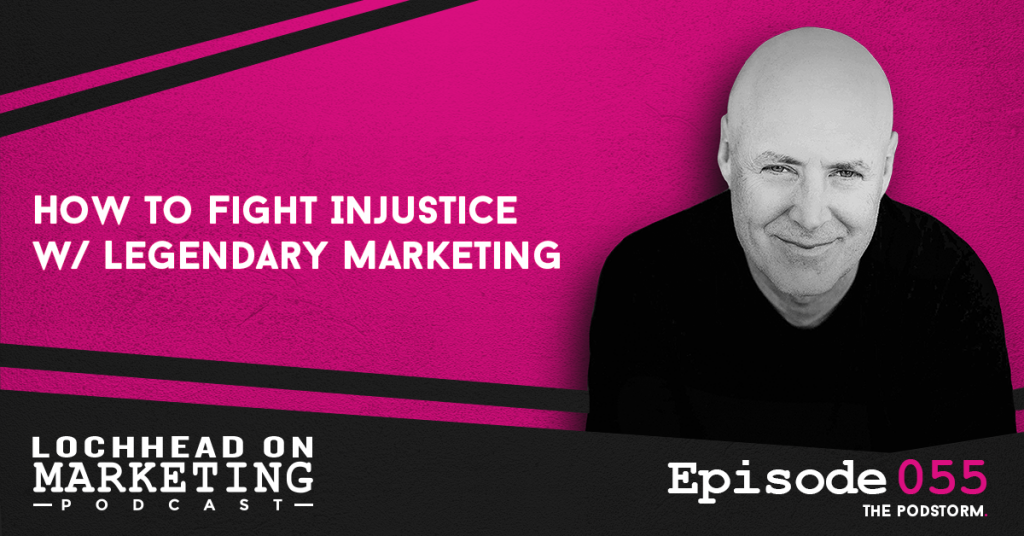
Podcast (lochheadonmarketing): Play in new window | Download (Duration: 14:08 — 9.7MB) | Embed
Subscribe: Apple Podcasts | Spotify | RSS | More
Today, let’s take a look at the role of marketing in driving real, dramatic, impactful, important social change. We dig into topics like the battle against AIDS, the women’s movement, and even the founding of the United States of America as actual acts of legendary marketing, and what you might think of as category design.
It moves the world
Christopher believes that legendary marketing does more than just drive sales. Legendary marketing does more. Marketing a provocative point of view creates a new category of social fabric that drives real societal change
“I would argue to you that the greatest marketers, the most legendary marketers are actually category designers. They introduced the world to new ways of thinking, playing, and working and for major societal change to happen. It requires new categories of thinking, what you might think of as very different points of view, points of view that move the world from the way it is today, to the way we want it to be.” – Christopher Lochhead
More on Societal Change
From spreading awareness about AIDS, to equality wage for equal work, to the establishment of the United States of America, Christopher carefully breaks down why these are provocative points of view that later on demanded societal changes.
He reads several quotes lifted from the actual Declaration of Independence and touches on self-governance, which is timely at the moment of recording, where there is civil unrest in the US because of the untimely death of African American George Floyd.
Designing The World of Your Choosing
As Christopher believes this is a cocoon time, a time in between pre-Covid19 and post Covid19, he poses a question on what kind of world we would like to design?
“So what am I saying to you? Whether it’s a legendary entrepreneur, artist, or social change agent? The question facing all of us in the United States, particularly and frankly, around the world, is what kind of country and what kind of world do we want to design now?” – Christopher Lochhead
Ultimately, for exponential change to happen, it requires category design. It requires the marketing of a point of view that mobilizes a movement to take the world to an exponentially different future. This is why Christopher thinks a real social change requires category design and legendary marketing predicated on a powerful and different point of view.
Bio:
Christopher Lochhead is a #1 Apple podcaster and #1 Amazon bestselling co-author of books: Niche Down and Play Bigger.
He has been an advisor to over 50 venture-backed startups; a former three-time Silicon Valley public company CMO and an entrepreneur.
Furthermore, he has been called “one of the best minds in marketing” by The Marketing Journal, a “Human Exclamation Point” by Fast Company, a “quasar” by NBA legend Bill Walton and “off-putting to some” by The Economist.
In addition, he served as a chief marketing officer of software juggernaut Mercury Interactive. Hewlett-Packard acquired the company in 2006, for $4.5 billion.
He also co-founded the marketing consulting firm LOCHHEAD; was the founding CMO of Internet consulting firm Scient, and served as head of marketing at the CRM software firm Vantive.
Links:
African Americans are incarcerated more than 5 times the rate of white people
From Kenneth Cole, a New Solidarity
We hope you enjoyed this episode of Lochhead on Marketing™! Christopher loves hearing from his listeners. Feel free to email him, connect on Facebook, Twitter, Instagram, and subscribe on iTunes! You may also subscribe to his newsletter, The Difference, for some amazing content.
054 Why You Need A Big Hairy Audacious Goal | Marketing PodStorm 16
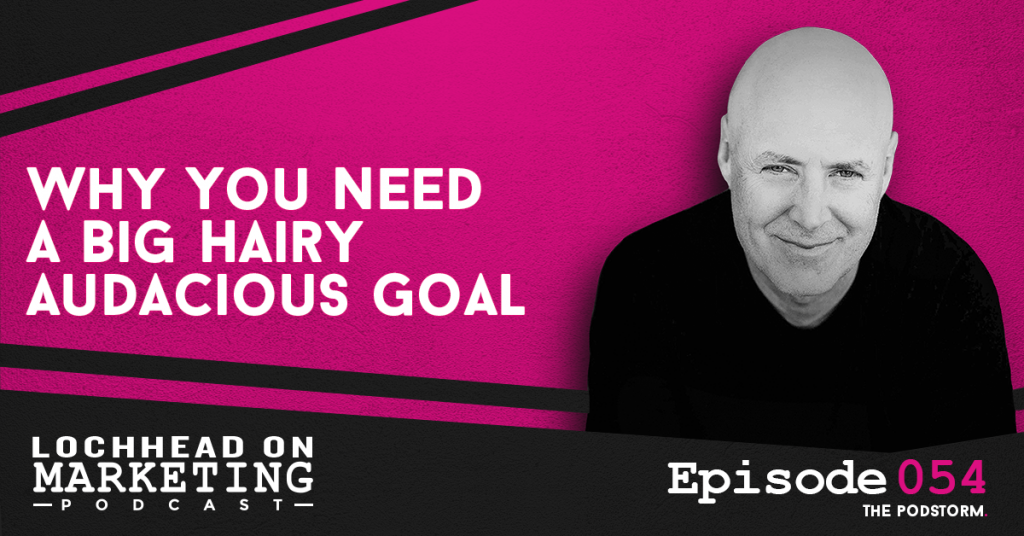
Podcast (lochheadonmarketing): Play in new window | Download (Duration: 9:58 — 6.8MB) | Embed
Subscribe: Apple Podcasts | Spotify | RSS | More
We are hoping you read Jim Collins two legendary books Built to Last and Good to Great. These are game-changers with insanely great research about businesses. In those books, he introduces the concept of a BHAG, which is an acronym for big, hairy, audacious goal. In this episode, let’s talk about why you need, what legendary author Jim Collins calls, a big, hairy, audacious goal.
Man On The Moon Mission
One of the greatest examples of a BHAG is when John F. Kennedy said: USA is going to put a man on the moon within the decade. It is specific, clear, and clearly big and hairy, audacious at the time. Moreover, it is complete since it has time on it.
“Why does this matter in the context of marketing, in particular, in the context of a category design approach for designing and dominating market category? Well, the first part of achieving the goal is to declare it. When you tie a BHAG to a category design strategy, something amazing happens.” – Christopher Lochhead
Microsoft’s BHAG
One of the most powerful examples in the tech industry was Microsoft when they were building the personal computer category. They had a BHAG when they called a computer, a PC on every desktop.
“Number one, PC on every desktop is very clear. Number two, by doing that, Microsoft is declaring themselves the category queen because there’s an interesting thing, in the minds of the market, in the minds of people, the company evangelizing the category must be the leader or category queen or king in that category. Microsoft, in this case, is evangelizing what they want to happen.” – Christopher Lochhead
Are you part of the 10%?
At the beginning of this PodStorm, episode number 39, Christopher shared that approximately 10% of companies get stronger in a downturn. Now, he encourages you to adopt that as a possible goal for your company.
“By declaring your BHAG, and making it clear to your people, your prospects, your customers, your investors, and — this one I actually love the most — your competitors, all of a sudden you’ve planted your flag on something. It becomes very unifying, very focusing. and it motivates your people. Hopefully, it inspires your customers, investors, and partners, and it scares the shit out of your competition. And to me, legendary marketing does all of that.” – Christopher Lochhead
To know more about Christopher and how why you need a BHAG for your company, download and listen to this episode.
Bio:
Christopher Lochhead is a #1 Apple podcaster and #1 Amazon bestselling co-author of books: Niche Down and Play Bigger.
He has been an advisor to over 50 venture-backed startups; a former three-time Silicon Valley public company CMO and an entrepreneur.
Furthermore, he has been called “one of the best minds in marketing” by The Marketing Journal, a “Human Exclamation Point” by Fast Company, a “quasar” by NBA legend Bill Walton and “off-putting to some” by The Economist.
In addition, he served as a chief marketing officer of software juggernaut Mercury Interactive. Hewlett-Packard acquired the company in 2006, for $4.5 billion.
He also co-founded the marketing consulting firm LOCHHEAD; was the founding CMO of Internet consulting firm Scient, and served as head of marketing at the CRM software firm Vantive.
Links:
We hope you enjoyed this episode of Lochhead on Marketing™! Christopher loves hearing from his listeners. Feel free to email him, connect on Facebook, Twitter, Instagram, and subscribe on iTunes! You may also subscribe to his newsletter, The Difference, for some amazing content.
035 Your Brand Will Be Defined By What You Do During Coronavirus
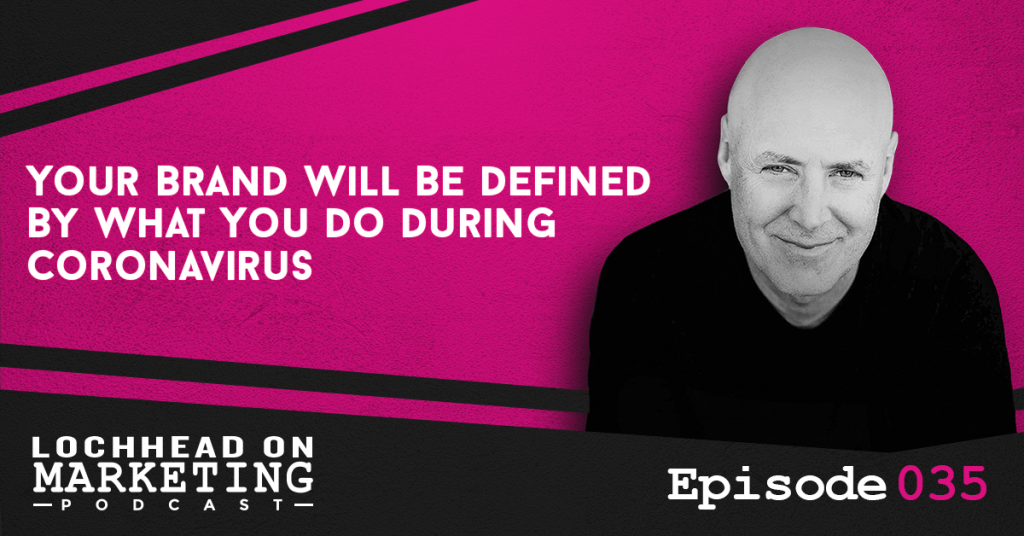
Podcast (lochheadonmarketing): Play in new window | Download (Duration: 9:27 — 6.5MB) | Embed
Subscribe: Apple Podcasts | Spotify | RSS | More
Extraordinary times call for legendary leadership. In this episode, we talk about why your brand will be defined by what you do during coronavirus. This is a moment of truth. What leaders do in moments of truth define who they become and what happens to our brand.
“I think people are going to remember what you did or didn’t do during this crisis. How companies treat humanity during this crisis will have a long term impact.” – Christopher Lochhead
Focus on People
Christopher had been speaking with entrepreneurs about the discussions they should focus on to make a difference during this coronavirus crisis. First is: focus on people.
He shares about an Australian CEO who discussed with his people how they can make the most out of their cash on hand and accounts receivable. Half the people would rather get half of their salary than getting laid off.
“I think legendary leaders are open about these things and talk to the people about them. Try to do it in a way that is humane as possible and that extends your cash runway as possible.” – Christopher Lochhead
Focus on Customers
Now is the time to make a difference with customers. Christopher cites an entrepreneur who runs a gym. Rather than making a decision amongst him and his executive team, he asked their customers, if they want to cancel their subscription, do they want to pay half. A good 80 percent of their customers came back and said “we want to keep on paying you at the full rate.”
In addition, they’re doing a lot like what other legendary people in the health and wellness and fitness industry are doing, they are putting a lot of content on the internet.
“By being open real with people, they have endeared themselves to their customers in a very, very powerful way.“ – Christopher Lochhead
Focus on Humanity
What are we doing for humanity? Now is a great time to be radically generous. In fact, the company Dyson produced a new type of respirator in 10 days and have been supplying 15,000 for this pandemic fight.
“We have to ask ourselves what do we have to contribute? It might be money, it might be other things. it might be expertise. In our case, we have a podcast to contribute, so we’re doing that.” – – Christopher Lochhead
To hear more about Christopher’s thoughts on how a company’s action during this crisis will affect their brands, download and listen to this episode.
Bio:
Christopher Lochhead is a #1 Apple podcaster and #1 Amazon bestselling co-author of books: Niche Down and Play Bigger.
He has been an advisor to over 50 venture-backed startups; a former three-time Silicon Valley public company CMO and an entrepreneur.
Furthermore, he has been called “one of the best minds in marketing” by The Marketing Journal, a “Human Exclamation Point” by Fast Company, a “quasar” by NBA legend Bill Walton and “off-putting to some” by The Economist.
In addition, he served as a chief marketing officer of software juggernaut Mercury Interactive. Hewlett-Packard acquired the company in 2006, for $4.5 billion.
He also co-founded the marketing consulting firm LOCHHEAD; was the founding CMO of Internet consulting firm Scient, and served as head of marketing at the CRM software firm Vantive.
Links:
James Dyson designed a new ventilator in 10 days. He’s making 15,000 for the pandemic fight
We hope you enjoyed this episode of Lochhead on Marketing™! Christopher loves hearing from his listeners. Feel free to email him, connect on Facebook, Twitter,Instagram and subscribe on iTunes! You may also subscribe to his newsletter, The Difference, for some amazing content.

